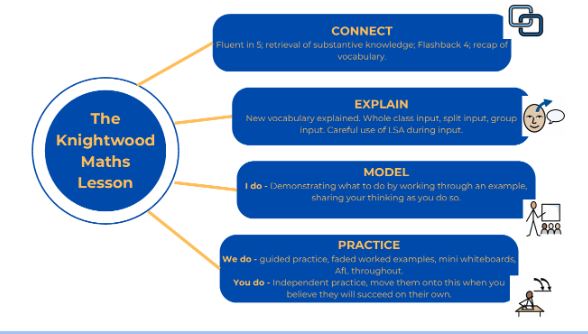Maths
Maths at Knightwood cultivates curiosity, encouraging students to ask questions, seek patterns and make connections between mathematical concepts. We prepare children to tackle any maths challenge with confidence and resilience.
Intent:
Maths at Knightwood is built upon the belief that all children can achieve high standards. We develop a deep understanding of mathematical concepts and encourage connections across various mathematical ideas. Through a combination of concrete, pictorial and abstract representations, children engage in exploratory learning, developing fluency in fundamental mathematical operations. Our curriculum emphasises reasoning, logical thinking and the selection of efficient problem-solving methods. We challenge pupils to delve deeper by asking 'why' to promote critical thinking and a deeper understanding of mathematical principles. By integrating these approaches, we empower pupils to become confident, skilled mathematicians prepared for future academic and real world challenges.
Implementation:
Key Stages 1 and 2 follow the Hampshire Scheme of Learning, which uses a cyclical approach to allow for continuous reinforcement of learning across different phases over the year. Each maths unit follows a learning journey-based approach. This structured framework ensures that children are continuously engaged in the learning process, building upon previous knowledge and skills while consistently assessing their progress and comprehension of mathematical concepts. Year R follows the White Rose Scheme of Learning, following a structured framework tailored to the Early Years curriculum, fostering foundational mathematical understanding through developmentally appropriate hands-on activities and resources.
We prioritise the Concrete, Pictorial, and Abstract (CPA) approach, ensuring children engage with mathematical concepts through hands-on experiences, visual representations, and abstract reasoning to deepen their understanding. Daily retrieval practice through ‘Fluent in Five’ promotes fluency in fundamental mathematical skills, facilitating accurate and efficient recall of facts and procedures, whilst weekly retrieval through ‘Flashback Friday’ reinforces previously learnt concepts from ‘this week’, ‘last week’, ‘this term’ and ‘last year’. Spoken language is developed through mathematical discussion by practising metacognition during ‘Fluent in Five’. To nurture effective reasoning skills, we pose thought-provoking questions that challenge children to explain their mathematical thinking and justify solutions, fostering a deeper comprehension of concepts. Our maths curriculum is supplemented by high quality reasoning and problem solving resources from ‘I See Reasoning’, ‘White Rose’ and ‘Classroom Secrets’. We utilise the Polya problem-solving model to guide students through understanding, planning, execution, and reflection stages, equipping them with efficient problem-solving techniques.
We integrate mathematical concepts across the wider curriculum, emphasising their practical applications in subjects such as geography, computing, and science. For example, chidlren may use mathematical skills to analyse data in geography, employ computational thinking in computing, and apply mathematical principles to scientific experiments and data analysis, fostering a holistic understanding of mathematics and its relevance in various contexts.
At Knightwood, we integrate the NCETM (National Centre for Excellence in the Teaching of Mathematics) progression maps into our curriculum to provide a structured framework for understanding the sequential development of mathematical concepts.
Formative assessment is incorporated throughout maths lessons through live marking and immediate verbal feedback, enabling teachers to assess students' understanding and progress continuously, addressing misconceptions, informing instructional decisions and adjusting teaching strategies to meet students' needs effectively. We use PUMA assessments for Years 3, 4 and 5 to provide a standardised end of year assessment. The National Curriculum assessments provide a standardised end of year assessment for Year 6.
Mastering times tables up to 12 x 12 by Year 4 is pivotal. We prioritise a conceptual understanding of multiplication, emphasising comprehension of 'why' and 'how' the times table functions. Children are introduced to the concept of multiplication through a combination of visual aids and manipulatives such as number lines and arrays. We use Hampshire's one, ten, five derived resources to teach these concepts and Times Tables Rock Stars to practise quick and efficient recall.
Impact:
Through our comprehensive mathematics curriculum, we cultivate a learning environment where children become fluent, competent, and efficient mathematicians. They swiftly recall facts and procedures, recognise connections within mathematics, and articulate reasoning clearly, demonstrating the adaptability to transition between various mathematical contexts and representations. This approach fosters a growth mindset, where mistakes are viewed as integral to learning, and challenges are perceived as opportunities for growth. As a result, children develop resilience, tackle mathematical problems with enthusiasm, and develop confidence for their further studies, work and adult life. Our outcomes are strong across the school.


.JPG)
.JPG)
.JPG)
.JPG)
.JPG)
.JPG)
.JPG)